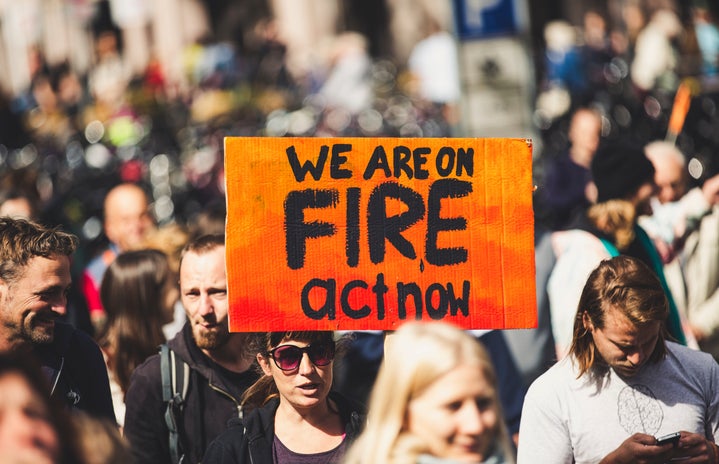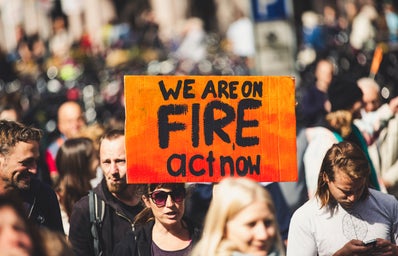Coffee: made. Teeth: brushed. Deodorant: on. It’s the most I’ve done as I sit at my desk in sweatpants and a bandeau, doing nothing in particular while I wait for my first class to roll around.
Only two years ago, I began my first day of classes with a photoshoot. (I know.) My senior year, and here I sit, charging my AirPods as I charge myself with too much coffee. I wear the heavy garb of lethargy, the worn-down slippers of apathy, the smeared glasses of inattentiveness. The desire to pack a stylish punch into my first impression is absent; what does it matter if you can’t greet a room with your energy?
It is September already, and our government has shown little more competence in handling the state of our nation since the pandemic began. In watching our death and cases rates break records, in reading the continued injustice against Black bodies by police and our system as a whole, in experiencing the sweltering political climate—dressing up to attend online orientation seems trivial by comparison. Last year ended with me writing papers while protests and flashbangs created a cacophony mere blocks from my building. It becomes difficult to fathom the importance of editing or learning about theology when history is being made in ways I have never before experienced.
It’s 10:55 AM and I log into my first of two Zoom calls for the day. The professor is introducing herself, and I spot a handful of familiar faces. As we greet each other and explore what the class will be about, I feel myself pulled back into the world of academia—the place that stretches my mind, challenges my viewpoints, hones my skills. I am reminded that this current time is not stagnant; endless conflict is unsustainable, and I feel the hurricane winds of change blowing through the city streets, through my Instagram feed.
I can peel my eyes from the tumultuous world outside and consider the ethical implications of biotechnology, for example, because it matters. The ways in which I develop myself personally and professionally will influence the ways in which I can influence the world when my time comes, so studying that which seems unrelated attains purpose. Long claws of guilt pull at my skin as I pull myself away from the immediate activism, but it is okay because I know I’m not the only one out there fighting. Hell, I’m not even the most impactful person fighting this fight. I must trust that the passion and beliefs which push forth this necessitation of equity, empathy, and justice will continue to carry its momentum. “Justice for Breonna Taylor” continues to fill my screen; guidance for BLM protests and resources for donation flood my Facebook; reminders to register for the upcoming election inundate my email. These things won’t stop just because I have to step back for nine months.
The internal conflict of where to place my attention in a time of a poorly handled pandemic, of trying to dismantle inhumane racist structures, of correcting the intolerable cruelty of wealth inequality, and also succeeding in college is an intense one. In the thick of it, it seems there is no right answer—and I’m white, which means my experience in this is not even close to being as intense and emotionally impactful as it is to people of color. But when I step back and take in the bigger picture as best as I can, I see that my time can come a little later. Negotiating my microsphere against the macro with all that’s going on in the world is fresh territory, but it is doable. I can continue to donate, sign petitions, and spread awareness while I place the brunt of my attention on school. I can ask my friends to ensure they are registered to vote come November and normalize talking politics in a healthy way. I can continue to push for difficult but necessary conversations in the classroom because they are not mutually exclusive spaces. I can give my primary attention to school and my extra energy to activism because the work I do now in academia can set the groundwork for the work and contributions I can make afterwards. This is my privilege in many ways—but it’s also my duty, to recognize when and where and how I can be most effective in supporting those who are disenfranchised.
I can’t pretend to know what the future holds, what the election outcome will be, how much life our planet can still sustain. But I do know that time moves forward. I know that change is intrinsic to nature and life. I know that that which is truly good will be sustainable, while the bad is not. If there is nothing else to hold onto, I will hold onto that.
And if there is nothing else we can do, we can still vote. The political is the personal, the social. It affects real people, even if they aren’t the people we see. All of us must vote—vote like every life depends on it, because in many ways, every life does.


